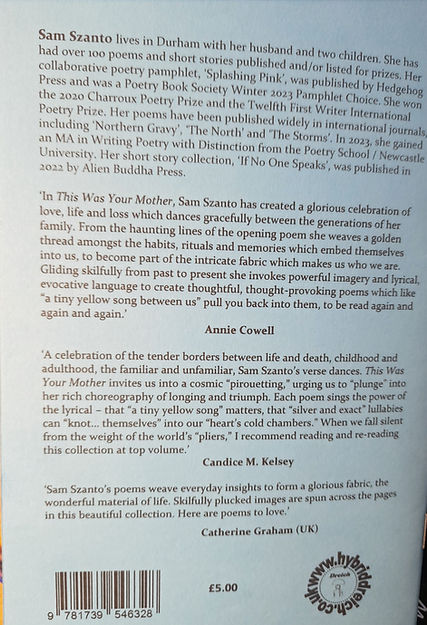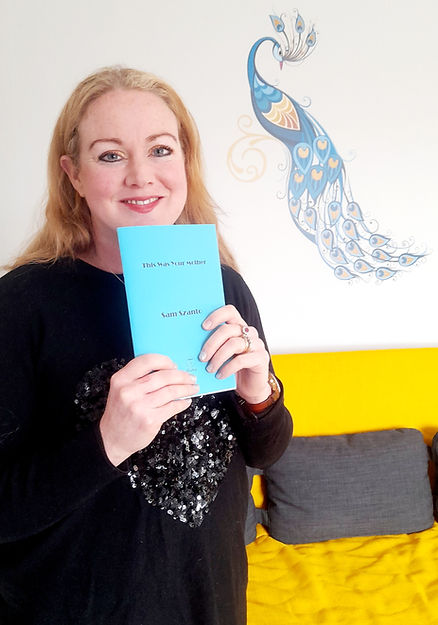20 Questions with... Julie Maxwell
- samszanto2
- Jul 19, 2023
- 7 min read

Julie Maxwell is a novelist and literary critic. Her debut novel You Can Live Forever (Jonathan Cape) won a Betty Trask Award and was Book of the Month on BBC Radio 5 Live and a TLS Book of the Year. These Are Our Children (Quercus) was an Observer Book of the Year. She has been the recipient three times of an Authors’ Foundation award from the Society of Authors. The Image of the King (Sharpe Books) is her first historical novel. Julie Maxwell is also a Shakespeare scholar and has held Fellowships in English Literature at both Oxford and Cambridge Universities. She co-edited Shakespeare and Quotation (Cambridge University Press) and has written on numerous contemporary literary topics for Areté magazine. You can find her on Twitter @JMaxwellAuthor
1. Please introduce yourself. Where are you from? What was your life like growing up?
I was born in Southall and grew up in Greater London. My father was an Irish immigrant who ran his own construction equipment hire company. As a child it thrilled me to see the words ‘Maxwell Plant Hire’ written on the sides of transit vans and JCBs. My mother taught me how to read and write at a very young age and I have never looked back.
2. Did you always want to be a writer? If you also work, what do you do / did you do?
I always wanted to be a writer but growing up I did not know anyone who was. It seemed about as remote as becoming an astronaut. My only clues lay in the brief author biographies I found in the books I read. I started to notice that many writers had attended Oxford University. Unfortunately, I did not know anyone who had gone to Oxford either. But my grades were good enough to apply and I selected my college, Christ Church, because it seemed to have produced more writers than anywhere else. Once I was there, however, I gave up the idea of becoming a novelist. I was studying Dickens and Shakespeare and Milton and did not see how I could ever hope to write anything worthwhile myself. So I became an academic, like the Oxford tutors who had nurtured me and whom I greatly admired. About twenty years ago, however, when I was a Junior Research Fellow at New College, Oxford, I met the poet and editor Craig Raine, who encouraged me to write. He pointed out that Shakespeare himself is an uneven writer. So I started to write novels as well as literary criticism. Eventually, about a year after the birth of my second child, I gave up lecturing so I would have more time to write and to spend with my young family.
3. Tell us about your most recently published work in a sentence.
The Image of the King retells the story of the trial and execution of Charles I by alternating between the viewpoints of the king and the republican poet Milton.

4. What are you working on right now?
A series of author interviews (!) and a short story. Something happened to me about three weeks ago and I thought, ‘That’s got the shape of a story.’ For once, life was art. So I wrote it down rather quickly. But I need to add some details.
5. Do you have a writing routine, and if so what it is?
Not exactly. I am a very all-or-nothing person, so while I am working on a novel I am often busy with it at all hours. I accomplish the most in the morning, however, so I prioritise that time.
6. Where do you write – always in the same space, or different places? Can you write ‘on the move’?
I generally write in a very tiny study that I like for its simple functionality. The room – originally designed as a walk-in closet – is right at the top of our house, tucked into the eaves of the roof. There is a skylight directly above my head. I am so close to the sky, in fact, that the room rattles and creaks whenever the weather is bad, and then I fancy myself as Robinson Crusoe aboard ship. I can and do write elsewhere, however. I loved calligraphy as a child and I still like to write longhand in notebooks when I am not at my desk. I write quite literally ‘on the move’ on daily walks at lunchtime and I am constantly redrafting sentences in my head.
7. What advice do you have for other authors who are just starting out? What is the best advice you’ve heard?
When I was starting out, I was advised that ‘all writing is rewriting’ and that the only rule in writing is not to bore your reader.
8. Do you enjoy live readings or are they are a necessary evil – or somewhere in between?
I am too nervous a person to enjoy public speaking. Fortunately, I am rarely asked. A friend of mine, the writer and journalist James Woodall, recently enthused about literary festival events: ‘You’ve got 500 people hanging onto your every word.’ Me: ‘That’s exactly what I’m worried about.’ There was one occasion, however, when I felt I might understand why other writers enjoy this. I was giving a reading as part of a day comprised of largely academic talks. So I was the light relief. To my surprise, when I read a comical excerpt from my novel These Are Our Children, the whole room responded. People began to sit up again, to smile, to relax. I felt I had reached them.
9. Are there recurring themes in your work? Where do you feel these emanate from, if so?
I have an obsession with truth. In my novel You Can Live Forever the heroine is brought up in a whacky Christian cult that publishes a magazine called ‘The Plain Truth’. Of course, it’s anything but. The heroine’s father is also – to borrow William Minto’s description of Daniel Defoe – ‘a great, a truly great liar, perhaps the greatest liar that ever lived’. In my latest novel The Image of the King, the dual perspectives of the poet and the king allow equal weight to irreconcilable versions of religious truth: Puritanism versus Anglicanism. Both characters believe their lives to be guided by divine providence, and both cannot be right. This is not just a historical problem: we are now living in a post-truth world and that worries me.
10. Should writers have a moral purpose? What is the purpose of a writer in today’s society?
The most obvious moral of the novel is empathy. Milan Kundera once wrote that a novel’s characters do not ask to be admired, they ask to be understood. There is a theory that novel readers learn empathy through sympathising with characters and vicariously experiencing perspectives they would otherwise never know. The counter-argument is that people who enjoy novels tend to be more empathetic in the first place. But it is probably a bit of both. Imaginative empathy is the work of the writer as well as the reader. In recent years, however, the empathy of the novelist has come under attack, redescribed as cultural appropriation. The same logic would make the historical novel impossible. Much more worryingly, this position also implies that we cannot really empathise with each other, after all. I once attended a book club discussion of my novel These Are Our Children and was surprised to be criticised by its members for not expressing the morality they would have liked to see in the book.
11. Do you write between genres or not?
I am not a genre writer in the popular sense. Insofar as I belong in a category, I write literary fiction, which can of course encompass sub-genres such as literary-historical novels and literary thrillers. The tone of my work is, however, often blackly comic: hence the alternative working title for The Image of the King was Gallows Humour. As an academic I used to teach the history of literary genres, and I am conscious of writing in an almost Elizabethan tragi-farcical mode. This is my worldview. Even in the grimmest situations, so much of life is amusingly ridiculous – thank goodness.
12. Which living writers do you most admire?
Craig Raine and Ian McEwan.
13. Which dead writers do you most admire?
Shakespeare and Dickens.
14. What’s the book you wish you’d written?
None, because then I would be somebody else entirely. I do occasionally wish, though, that another novelist – Ian McEwan, for preference – were writing my novels. Last year I was working on a plot sequence I found so exciting that I really wanted to be racing through it as a reader rather than writing it. I could just imagine how richly McEwan would have realised the story.
15. What other external influences do you have: nature/place, music etc?
When writing I almost always listen to Sting albums. He tells so many brilliant and surprising stories via his lyrics, and I admire their narrative economy. The album title Ten Summoner’s Tales says it all. Sting is flash fiction with an orchestra.
16. Do you suffer from ‘writer’s block’ and how do you overcome it, if so?
I put a lot of work into getting the first chapter of a novel right and sometimes struggle to get beyond it. If it looks like a great beginning, then I worry about how I am going to sustain it across an entire book. I have various solutions. One is to set myself a modest daily target of around 500 words. Another is to put the draft aside and work on something else for a while, then go back to it fresh. I also find that periods of writing nothing at all are beneficial because by the time I go back to the desk, I am eager to write.
17. What’s been your favourite reaction to your writing?
You Can Live Forever had a review in the Herald that included the praise, ‘Maxwell writes with a vast, tenacious intellect’. It was difficult to get my head through the door for quite a while after that.
18. How do your family and friends feel about your writing?
My children are proud of me, which is what matters most.
19. Do you have a favourite bookshop?
Blackwell’s, Oxford. I have been going to this wonderful old bookshop since I was an undergraduate. I also like Blackwell’s for ordering in bigger quantities of my novels than anywhere else.
20. How do you see the future of writing? Will we become more or less dependent on Amazon?
I am not sure. I think Kindle is certainly an ingenious commercial invention, because it combines the lightweight storage of the ebook device with the instant gratification of the cheap purchase. 99p has become normalised as a book price. This is good news for readers but bad news for authors. In the end, of course, it could be bad news for readers too. If Amazon manage to monopolise book sales to the extent that bookshops are driven out of business, then Amazon will be able to charge anything they like. Recently I read that ebook sales are down, however, as people have enjoyed returning to bookshops after their closure during the pandemic.
You can buy The Image of the King here: https://www.amazon.co.uk/dp/B0C4YZY9J9










Comments